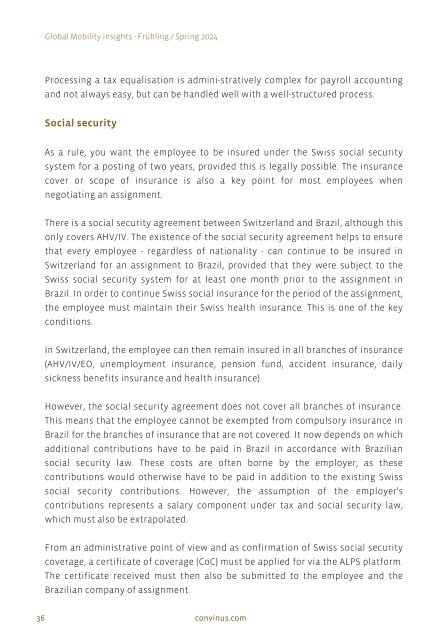Global Mobility Insights NEWSLETTER Frühling / Spring 2024
You also want an ePaper? Increase the reach of your titles
YUMPU automatically turns print PDFs into web optimized ePapers that Google loves.
<strong>Global</strong> <strong>Mobility</strong> <strong>Insights</strong> - <strong>Frühling</strong> / <strong>Spring</strong> <strong>2024</strong><br />
Processing a tax equalisation is admini-stratively complex for payroll accounting<br />
and not always easy, but can be handled well with a well-structured process.<br />
Social security<br />
As a rule, you want the employee to be insured under the Swiss social security<br />
system for a posting of two years, provided this is legally possible. The insurance<br />
cover or scope of insurance is also a key point for most employees when<br />
negotiating an assignment.<br />
There is a social security agreement between Switzerland and Brazil, although this<br />
only covers AHV/IV. The existence of the social security agreement helps to ensure<br />
that every employee - regardless of nationality - can continue to be insured in<br />
Switzerland for an assignment to Brazil, provided that they were subject to the<br />
Swiss social security system for at least one month prior to the assignment in<br />
Brazil. In order to continue Swiss social insurance for the period of the assignment,<br />
the employee must maintain their Swiss health insurance. This is one of the key<br />
conditions.<br />
In Switzerland, the employee can then remain insured in all branches of insurance<br />
(AHV/IV/EO, unemployment insurance, pension fund, accident insurance, daily<br />
sickness benefits insurance and health insurance).<br />
However, the social security agreement does not cover all branches of insurance.<br />
This means that the employee cannot be exempted from compulsory insurance in<br />
Brazil for the branches of insurance that are not covered. It now depends on which<br />
additional contributions have to be paid in Brazil in accordance with Brazilian<br />
social security law. These costs are often borne by the employer, as these<br />
contributions would otherwise have to be paid in addition to the existing Swiss<br />
social security contributions. However, the assumption of the employer's<br />
contributions represents a salary component under tax and social security law,<br />
which must also be extrapolated.<br />
From an administrative point of view and as confirmation of Swiss social security<br />
coverage, a certificate of coverage (CoC) must be applied for via the ALPS platform.<br />
The certificate received must then also be submitted to the employee and the<br />
Brazilian company of assignment.<br />
36<br />
convinus.com


















